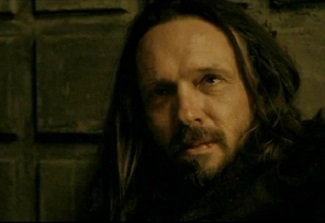Die (Dominic James, 2010): Canada
Reviewed by Mallarie Stevens. Viewed on Netflix.
“Sometimes we are more connected to perfect strangers than we think.” When six such perfect strangers inexplicably find themselves locked in a row of dimly-lit cells, the mystery of their connection to one another becomes the focus of Director Dominic James’ 2010 psychological thriller, Die. Lisa is a serial gambler who couldn’t handle the responsibility of raising her child. Melody is a drug-addicted teen whose parents never gave her the love she needed. Mark is an experienced cop whose partner is out searching for him. Robert is a wealthy businessman and philanthropist. Diane is a nurse, devoted to both her patients and her religious beliefs. And Zach is a successful psychiatrist, under investigation for over-prescribing medication to a patient.
As Die brings audiences into the lives of these six individuals, quick cuts from the strategically-lit, almost sepia-tone “prison” to the bright colors of their everyday lives present contrast that is both visually appealing and provides insight into the film’s tone. This engaging cinematography paired with a compelling story concept provides a solid foundation for an excellent film. This foundation, however, is simply not enough to raise Die to any level above average.
The six prisoners’ background stories not only draw far too heavily on clichés, they are also spread too thinly over the film’s 90 minute runtime, making it difficult to truly connect with any of them. Die does attempt to catch the viewer by surprise with several plot twists and curve-balls, but they are mostly too little, too late. Sophia, the determined detective who resolutely pursues the mystery of the strangers’ disappearances despite her captain’s warnings to stop, seems better suited to an episode of Law & Order (1990) than a feature-length film. Though her acting is perfectly acceptable, the script does not allow her any depth in which to develop, which is essentially true of the other characters as well.
Jacob, the orchestrator of the six’s imprisonment and the live-or-die game of chance that follows, has devised these “Trials”, as a direct response to his own childhood experience of witnessing his father commit suicide. But Jacob is not the typical depraved killer. Portrayed as more of a Jesus-like figure than a strong perpetrator, unoriginal dialogue and lack of a multi-dimensional personality make the higher-level religious concepts to which the story (and Jacob’s true mission) alludes difficult to buy into. “You can’t kill people who are already dead,” preaches Jacob. “They were prisoners of the lives they created for each other. I gave them a chance to be reborn.”
This idea of playing God is not at all new to the film world. From Frankenstein (1931) to Seven (1995) to the wildly popular The Hunger Games (2012), the concept of one human’s (or a group of humans’) control over the fate of other humans has always been prevalent in film, as well as literature. Considering that gameplay is also at the core of this film (the six prisoners represent the six sides of a die and they each must roll a dice to determine the fate of another “player”), it seems reasonable to conclude that Die is essentially just a watered-down version of the Saw (2004) franchise films. While that may be true, Die will still appeal to those who are intrigued by the psychological struggle of life versus death and the human will to survive, but want to skip the highly graphic violence and NC-17 rating of Saw. Of course, those who find the challenge of figuring out why a group of strangers have been locked up together or how they will escape, have plenty of options. Exam (2009) and the Cube films (1997 and 2002) might be better ones to explore.

1 Comment
Jump to comment form | comments rss [?] | trackback uri [?]